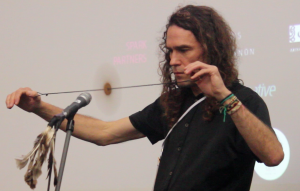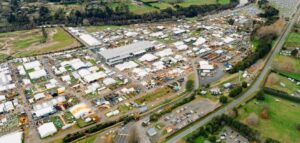Taonga puoro open Spark week
Musician Rob Thorne shares traditional Māori music with Wintec Spark.
Video shot and edited by Mereana Austin and Jason Renes.
The fog was blown away by the clarion call of a putātara (conch-shell trumpet) yesterday at the opening of the Spark Festival of Media, Arts and Design.
The putātara lead into a performance of haunting music created with taonga puoro (traditional Māori instruments) played by Manawatu musician and anthropologist Rob Thorne.

Taonga puoro is the collective term for Māori instruments and the traditions surrounding them.
Mr Thorne’s own journey with taonga puoro began more than 10 years ago when a friend brought him a kōauau (short flute) and asked if he could make it sing.
“I became extremely challenged by the simplicity of the structure of it but I couldn’t play it. So began a journey which, right now, I’m still walking.”
He admitted there is still more to be discovered about taonga puoro and after a decade of learning to play them, his task is now to unlock the hidden capabilities of each instrument.
“This part of the journey is about just working with the taonga to see what they do on their own,” said Mr Thorne.
“There are some instruments that I need to work with more, so I do.
“There are some instruments that are extremely challenging so I’m always finding new things within them.
“And there are some instruments that just speak to me as an artist and as a Māori.”
One way for Mr Thorne to widen his exploration of taonga puoro is through the use of modern music technology such as loop pedals.
He said using loop pedals enabled him to explore some of the traditional ways taonga pouoro were played in groups.
Mr Thorne used loop pedals in yesterday’s performance to record his instruments one by one then layer the recorded tracks over one another.
With this technique he entwined blaring pūkaea (long wooden trumpet), mournful pūtōrino (flute) and the small, whirling air-blade called the porotiti to create a soundscape that enthralled the Spark crowd and stirred the spirits.
Mr Thorne said an aspect of taonga puoro that set them apart from other instruments is the freedom one enjoys while learning to play.
“Whether it’s on the shore, or on a river, or under your favourite tree.
“[You’re] learning to play and playing for your own expression.
“I think that’s something that these instruments provide currently in a way that is fresh and new but taps into something that is very old.”
He compared the experience to learning guitar, whereby one is driven to learn the chords or learn the latest songs.
“I think these instruments currently subvert that,” said Mr Thorne.
“They short circuit the music within us.”




